Products
Spirits
Handcrafted, small batch, made with Washington barley.
Mortal Gin
Mortal Gin is, by type, a distilled London dry gin, and the list of its botanicals, the herbs and spices that give the gin its flavors, does not vary radically from the botanicals of any other London dry gin. There is no lavender, beet juice, feijoa, or alfalfa in our gin; that would only confuse the issue. What is in our gin, is an intensity of flavors (the good ones) that are somehow familiar but surprising. Often, the word “brighter” is used.
I love watching tasters smell the gin (we kinda insist on it) because the first whiff opens their eyes wider. Sometimes the first taste also elicits optical enlargment. As with the vodka, the eye reactions seem to be positive, because it’s typically followed by smiles and a purchase, OFTEN WHEN THEY STARTED THE TASTING BY TELLING US THEY DIDN’T LIKE GIN.

Mortal Gin

Te-Absolvo – Award Winning Vodka
Te Absolvo
Te Absolvo gave us our first award(LINK to award), bronze in the grain-to-glass residual flavor class at the American Distillersd Institute competition a couple of years back. Admittedly, grain-to-glass is almost certainly not the largest class to compete in, but we were up agaoinst others that, like us, made it ourselves, instead of buying barrels of industrial grain alcohol from the midwest, to be filtered and/or redistilled before bottling.
As for “residual flavor”, Te Absolvo is not completely flavorless. We’re guilty as charged. Some tasters say they can identify a malt note in the vodka, but more commonly the comments include something like “a bit creamy”. Since all of this is said by people with big smiles who proceed to buy the vodka, “residual flavor” seems to be a good thing.
Anyway, we hadn’t entered a contest before the award, and we haven’t entered one after, so I guess we quit while we were still batting 1000.
Mulligan
MULLIGAN, following the development of poitin to commercial whiskey, is essentially civilized poitin. Starting with a grain bill incorporating mmore flavorful malts than more typical whiskeys, its caramel and honey grain notes are enhanced by the soft tannin flavors from once-used bourbon barrel oak, cleaned and re-heat-treated to emphasize a diffferent flavor profile from its bourbon origins.
Mulligan’s smoothness, grain, and oak notes make it a great sipping whiskey, rocks or neat. While adding mixers to Mulligan violates no specific Washington statute, yet, it should be considered a crime against nature, if not the state.

Mulligan-XXX
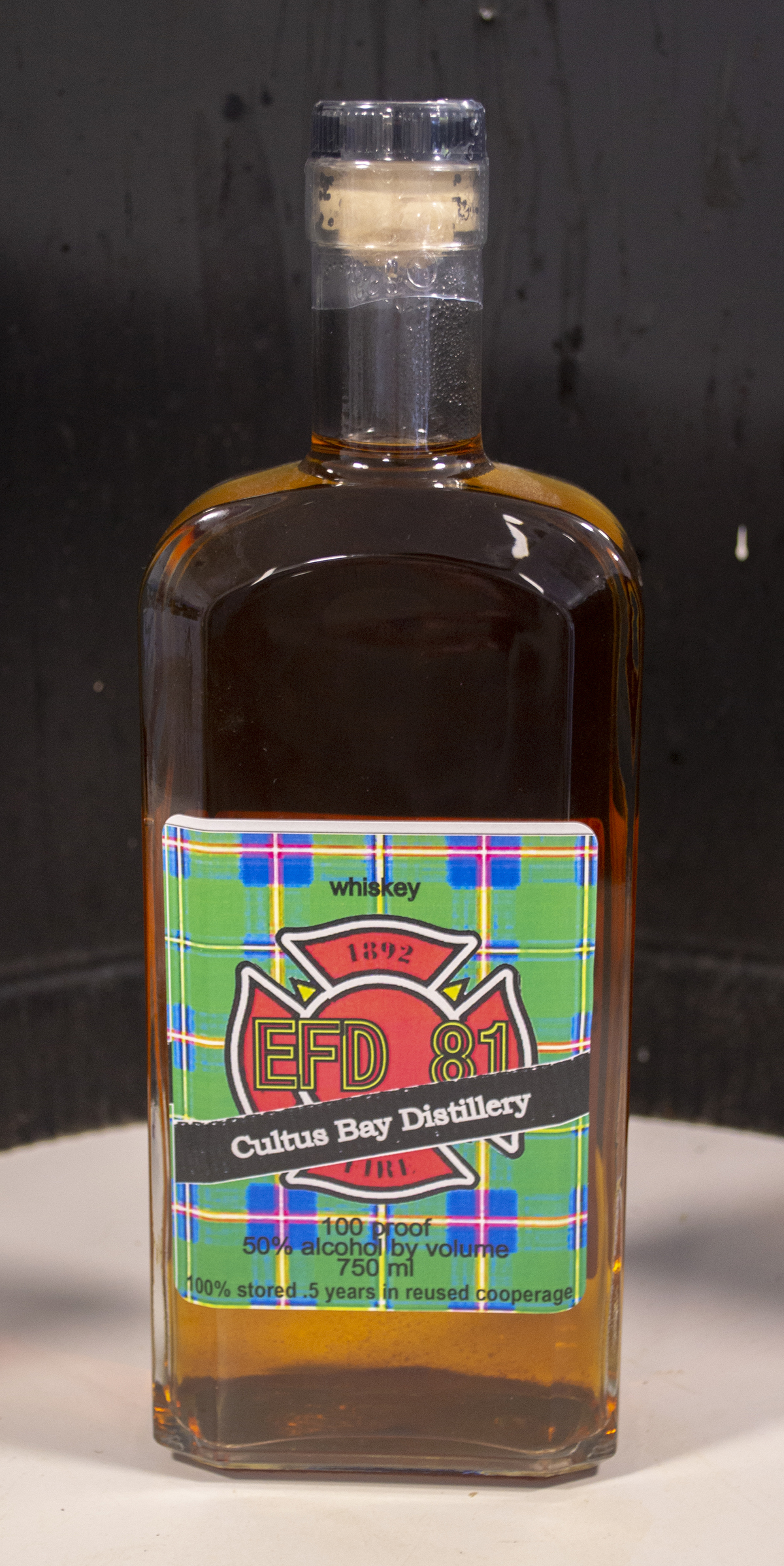
EFD 81 Whiskey 100 Proof
Whisky and Whiskey
All of our whisk(e)y is single-malt whisk(e)y, made with wort mashed from Washington State barley in our mash tun, fermented to beer in our fermenters, and multiple-potstilled for maximum flavor and smoothness in our self built potstills.
EFD 81, both 100 proof aand cask strength (~125 proof). Named for fallen Everett firefighter Gary Parks, EFD 81 is our latest whisky. Although it was intended to be in the general style of the heavier Islay scotches, taster comments indicate we came perhaps closer to Laphraoig than we had imagined. So far, our main problem with this whisky seems to be keeping it on the shelf.
From a technical standpoint, we know the grain bill is more flavorful than the heavy Islays, and heat-treating of the oak yields a flavor profile that’s not particularly Islay (althoughj it is lovely), but one taster, recently returned from a whisky-tasting week in Scotland, shook his head and uttered, “Laphraoig”. I’ll take “what you’ve got” EFD 81
Poitin
POITIN is our wild-card whiskey, malty and strong and white. It’s not something familiar to most, unless you’ve roamed the Celtic countryside, and have convinced some doubting local to give you a taste of what the locals drink (and make) when law enforcement isn’t looking. Poitin, pronounced puh-cheen, is Gaelic for “little pot”, a nod to the little pot stills hidden in bogs that produce that spirit.
What makes poitin important to us, and hopefully to you, is that as a high-proof white triple pot stilled single malt whiskey, it’s exactly what we need to age on oak and to proof down from 110 proof to 86 proof, to make our Mulligan Celtic-style whiskey.
Because poitin is fairly strong at 110 proof, not everyone can taste the rich malt flavor behind all that alcohol, but every bottle requires almost 7 pounds of barley malt to make, and our multiple distillation process maximizes that flavor.

Poitin
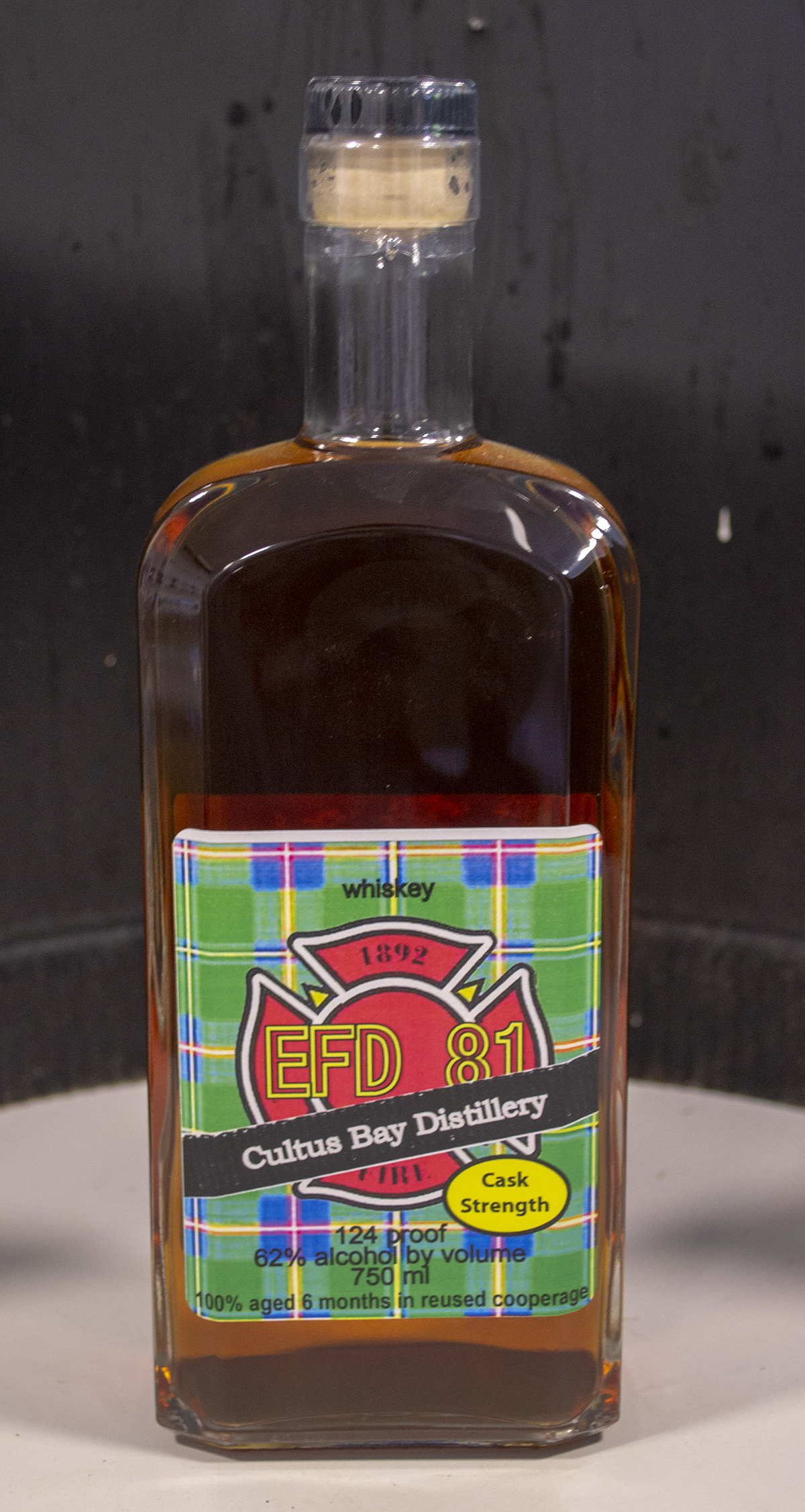
EFD 81 Whiskey 124 Proof
EFD 124 Proof
EFD 81, both 100 proof aand cask strength (~125 proof).
Brandies and Brandy Variants
All of these products (so far) trace their origins to the vineyard and the grapes they produce, although the paths from vineyard to spirits can vary a bit. At its simplest, a brandy is the product of distilling a wine made from fruit. Any fruit will do, but when we say “brandy”, usually we mean GRAPE brandy, brandy made by distilling grape wine.
And we DO make brandy from grape wine, often. At other times we make a special brandy from the solids pressed by the winemaker to separate the wine (or sometimes just grape juice) from the grape solids, the pulp, the skin, the seeds, and maybe a bit of the stems. These solids, which are waste to the winemaker, are called “pomace”, and were traditionally distilled by Italian and French grandmas in the back yard to become grappa (to the Italians) or marc (to the French).
I suspect the Italian grappa makers understand the rules and intent of grappa making more loosely than the French do for marc. For whatever reason, Italian grappa varies hugely, from a strong spirit with a clear grape flavor, identifiable as to variety, to a fiery fierce liquor that seems designed specifically to cause pain. Characteristically, Italians embrace both equally, while the French lean toward a generally more refined marc.
For our part (and our grappa), we’re big on flavor and not so much on pain, so we go to great lengths, specifically quadruple pot stilling, to maximize the grape varietal flavor in a smooth but strong spirit. If you’ve been gun-shy about grappas, you’ll probably love this one.
We also do traditional European eau de vie, water of life, clear strong un-aged grape brandies, with a clearly defined grape flavor, with no aging oak flavors to detract from it. Because our eaux de vie are made from local wines, the available varietals vary from year to year, and the brandy varietals vary as the available grapes. Our only current eau de vie is a viognier brandy, and is quite nice.
We also do a multivarietal oak-aged brandy called Wholly Spirit. This is our first liquor to be aged in twice-used white oak, and the aging tannins are therefore softer and gentler. There’s also a sweet spicy note from the oak, from which the brandy profits greatly. A drop of Wholly Spirit after a nice dinner is a wonderful indulgence.

Wholly Spirit
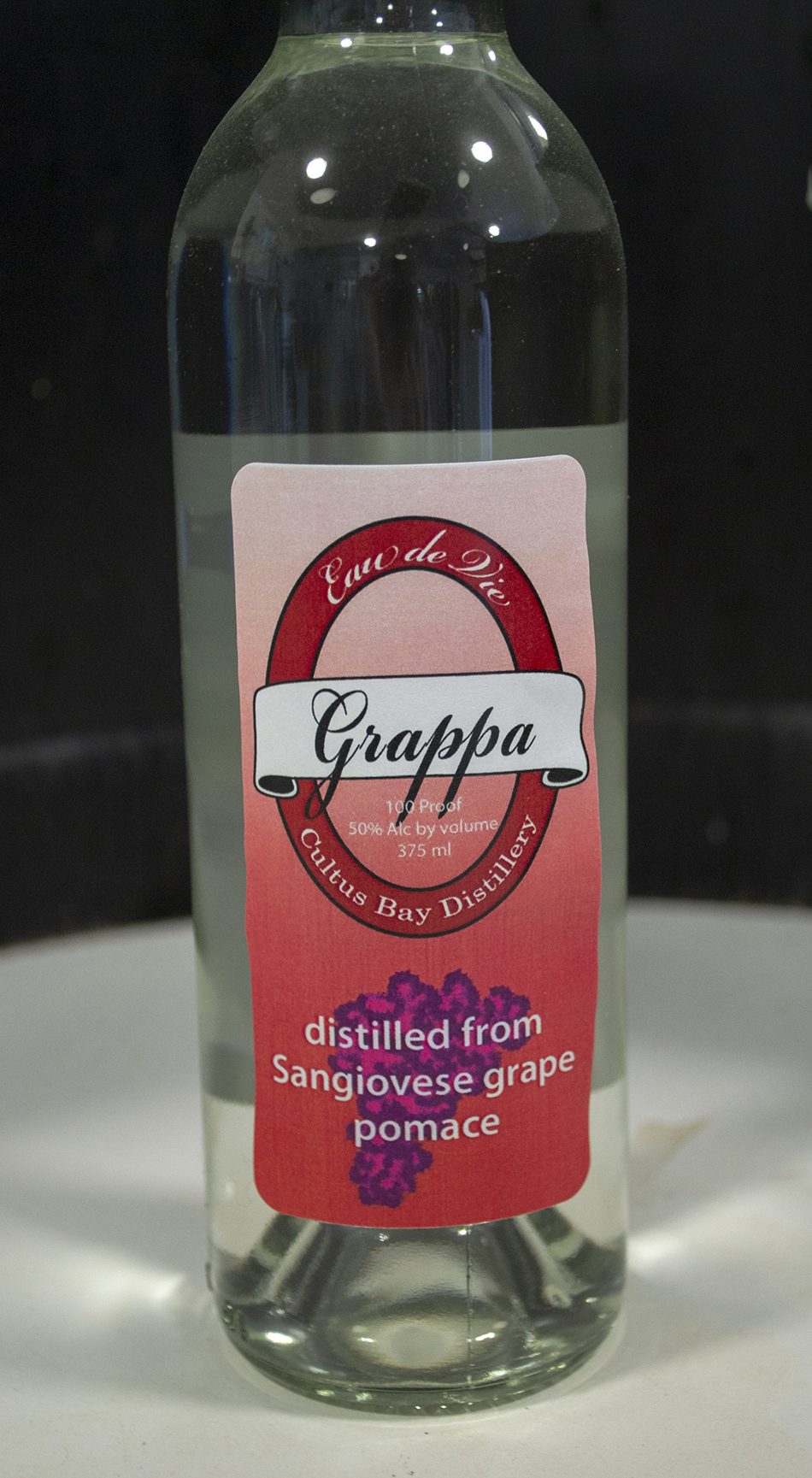
Sangiovese Grappa
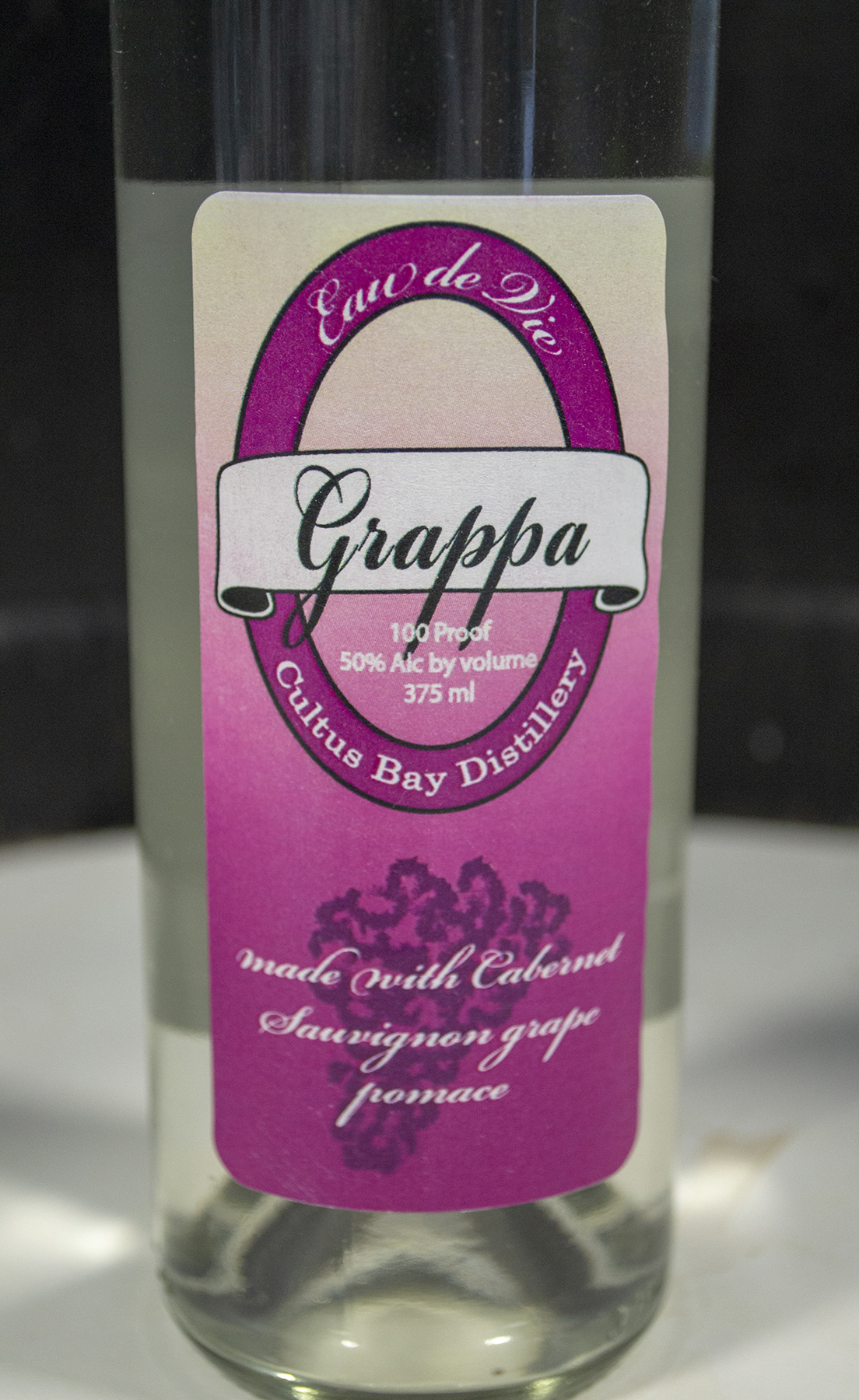
Sourvignon Grappa

Voignier Grappa

Voignier Grappa
Bitters
Bitters can be an important component in cocktails, and we have 4 to experiment with, or take a look at our recipes. We have lemon, orange, ginger, and most special ginseng.
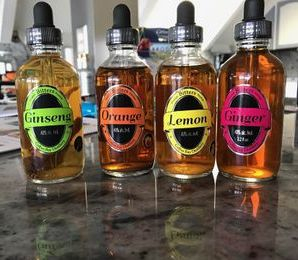
Bitters
Visit Us
We are located on the shores of Cultus Bay.
8311 Sandy Hook Dr, Clinton WA 98236
Call Us
Kathy Parks (360) 579 5632
Harry Sloan (360) 295 9551
Email Us
kathyparks@whidbey.com
harrysloan@comcast.net
